|
|
|
Sort Order |
|
|
|
Items / Page
|
|
|
|
|
|
|
| Srl | Item |
| 1 |
ID:
157594
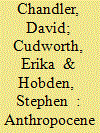

|
|
|
|
|
| Summary/Abstract |
This article is a collective response to ‘Planet Politics’ by Anthony Burke et al., which was published in this journal in 2016, and billed as a ‘Manifesto from the End of IR’. We dispute this claim on the basis that rather than breaking from the discipline, the Manifesto provides a problematic global governance agenda which is dangerously authoritarian and deeply depoliticising. We substantiate this analysis in the claim that Burke et al. reproduce an already failed and discredited liberal cosmopolitan framework through the advocacy of managerialism rather than transformation; the top-down coercive approach of international law; and use of abstract modernist political categories. In the closing sections of the article, we discuss the possibility of different approaches, which, taking the Anthropocene as both an epistemological and ontological break with modernist assumptions, could take us beyond IR’s disciplinary confines.
|
|
|
|
|
|
|
|
|
|
|
|
|
|
|
|
| 2 |
ID:
120477
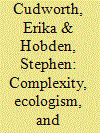

|
|
|
|
|
| Publication |
2013.
|
| Summary/Abstract |
Theorisations of the political in general, and international politics in particular, have been little concerned with the vast variety of other, non-human populations of species and 'things'. This anthropocentrism limits the possibilities for the discipline to contribute on core issues and prescribes a very limited scope for study. As a response to this narrow focus, this article calls for the development of a posthuman approach to the study of international politics. By posthuman, we mean an analysis that is based on complexity theory, rejects Newtonian social sciences, and decentres the human as the object of study. We argue for a decentring of 'the human' in our scholarship as imperative to understanding the complexity of the world. However, this approach also has a political incentive, which we describe as 'complex ecologism'.
|
|
|
|
|
|
|
|
|
|
|
|
|
|
|
|
| 3 |
ID:
079742
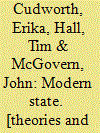

|
|
|
|
|
| Publication |
Edinburgh, Edinburgh University Press, 2007.
|
| Description |
vi, 322p.
|
| Standard Number |
9780748621750
|
|
|
|
|
|
|
|
|
|
|
|
Copies: C:1/I:0,R:0,Q:0
Circulation
| Accession# | Call# | Current Location | Status | Policy | Location |
| 052870 | 320.09/CUD 052870 | Main | On Shelf | General | |
|
|
|
|
| 4 |
ID:
123581
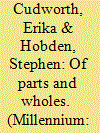

|
|
|
|
|
| Publication |
2013.
|
| Summary/Abstract |
While some theorists in International Relations have engaged with thinking about complexity, we would argue that few have thought it through to its logical conclusion - the interconnectedness of systems, and the implications for agency and structure. This article examines the structure-agency question using the framework of 'posthuman international relations', which draws on recent thinking in complexity and argues for an approach to the study of global politics that is post-Newtonian and non-anthropocentric. Key elements of a complexity-based approach are examined, and it is argued that these provide a novel way of considering issues of agency and structure. They also raise issues for the analysis of agency and the link between actions and outcomes. Complex systems can present problems of analysis related to unpredictability, causality and non-linearity. Having laid out a framework for thinking about action and context in international politics, the article turns to questions of agency and practice within complex systems. Perhaps the most significant claim here is that it is possible to conceive of agency beyond the human. Drawing upon Margaret Archer's discussions of primary and corporate agency, a threefold approach to thinking about structure and agency is developed, which allows us to think about agency beyond the human. Finally, an explanation is given as to why a complex approach to thinking about international relations ultimately implies a posthuman perspective.
|
|
|
|
|
|
|
|
|
|
|
|
|
|
|
|
| 5 |
ID:
142496
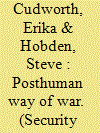

|
|
|
|
|
| Summary/Abstract |
Recent interventions from a ‘posthumanist’ or ‘new materialist’ perspective have highlighted the embedded character of human systems within a ‘panarchy’ of human and non-human systems. This article brings attention to a very particular element of materiality, one with a profound significance for issues of security – relations between human and non-human animals in instances of conflict. It is an indication of the deeply human-centred character of both international relations and security studies that almost none of the central texts mention the very significant roles that non-human animals have in the conduct of war. We argue that the character of war would have been radically different but for the forced participation by an enormous range of non-human animals. Even though, with the improvements in transportation over the last century, non-human animals are less evident in the context of the movement of people and equipment, they still play a significant number of roles in the contemporary war-machines of wealthy countries. Drawing on literature from critical animal studies, sociology and memoirs, this article discusses the enormous variety of roles that non-human animals have played in the conduct of war, and examines the character of human–non-human animal relations in times of war.
|
|
|
|
|
|
|
|
|
|
|
|
|
|
|
|
| 6 |
ID:
188989


|
|
|
|
|
| Summary/Abstract |
Zoonotic pandemics shine an uncomfortable light on how human lifeways facilitate the sharing of pathogens across species. Yet our lack of acknowledgement of our shared vulnerability with those non-human animals we raise or hunt to kill and eat, whose habitats we encroach upon and destroy, whose populations we undermine and threaten, has led us to the current human health crisis. The predominant political response to zoonotic pandemic has been bordering practices of surveillance, securitisation and bodily separation. These practices reflect intra-human and species hierarchies. They also fail to acknowledge the extent to which the boundaries of species are leaky, and are continually breached. A posthumanist zoonotic politics seeks not to attempt to border the leaky boundaries of species, but rather to insist on a re-ordering of species relations towards less exploitative and extractive ways of sharing the planet with the myriad creatures that constitute our world.
|
|
|
|
|
|
|
|
|
|
|
|
|
|
|
|
|
|
|
|
|